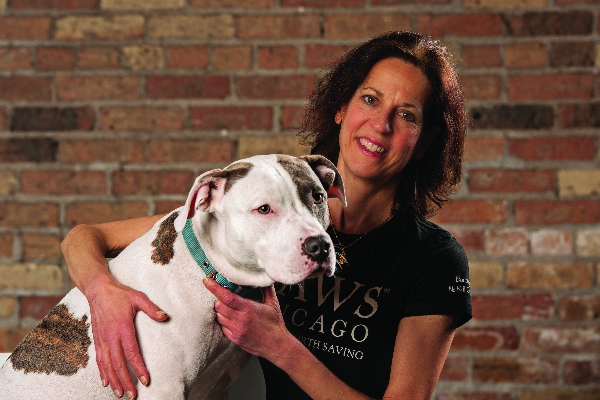Every dog lover has experienced the rewards of the unparalleled human-canine connection. When we break down the elements of this bonding, we see a mutual level of trust and respect. A dog that trusts you knows what to expect from you. A respectful dog listens and responds to you. For more on bonding, Joan Harris, PAWS Chicago’s Director of Training and Canine Behavior, sat down for a Q&A.
Q: What are some great ways to bond with a dog?
Joan Harris: Dogs as pack animals want a leader. By sticking to your priorities and boundaries, your dog will understand you and feel secure in what your response will be. Dogs who don’t know the rules or don’t know what to expect from you because of inconsistency are more insecure and they will not trust you the same way. And be sure to have fun! We often see that people do not engage in enough play with their dogs, especially at the beginning. By being too serious about obedience and all the things you want from your dog, you can be creating avoidance behaviors.
Q: What do you think is the biggest misconception about bonding with dogs?
JH: People often think, “If you just love your dog, they will love you back.” And yes, dogs are an incredible source of unconditional love. But dogs need a lot of other things. They’re physical animals, and they’re going to like the person who interacts with them and has fun with them and does the things that they enjoy. It is nice to sit on the couch and relax with your dog, but I think most dogs really bond with the person who interacts with them the most.
Q: How does training help you bond with your dog?
JH: If a dog was not socialized properly as a puppy, he may have fear issues toward certain things because he hasn’t been exposed to them or had bad experiences. There are windows of time in a puppy’s development where the most rapid learning occurs — he’s curious and open to new people and experiences.
There are also times, called fear imprint periods, during which anything that frightens him could be much more lasting or even permanent.
Q: How can bonding over time improve your dog’s life?
JH: All dogs look to bond—it’s part of their pack dynamics. In absence of a bond, you’ll see a nervous, insecure dog that doesn’t really know what to do next. Bonding makes them feel secure and it’s an enjoyable part of having a companion pet.
Q: What actions weaken bonding?
JH: Being too harsh, not recognizing fears that the dog has (seen by observing body language), forcing them to do things that they’re afraid of, and inconsistency are the main things that will diminish or destroy a bond.
Q: If your dog has never had training, what is the best way to start?
JH: Start out by interacting with them in a playful sense with food, then start to add small bits of obedience. Keep everything very short and try to end it while they’re still having fun with it. Start out slow and make it fun.
Check out the PAWS Chicago Training Center Facebook page for video tips on playing with your dog. facebook.com/pawschicagotrainingcenter
Sign up for training! From puppy school and basic manners to sport and enrichment, PAWS Chicago offers a range of innovative classes for your pup. Learn more at pawschicago.org/training
Read this article on page 16 of the Spring/Summer 2017 issue of the PAWS Chicago magazine.

